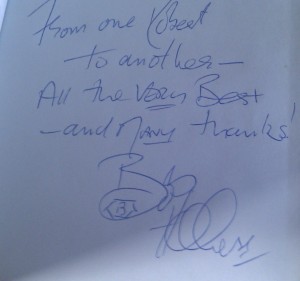 It is with great sadness that I heard news of the death of Bob Holness.
It is with great sadness that I heard news of the death of Bob Holness.
To many 30- and 40-somethings, he will be remembered as the host of iconic quiz show Blockbusters, but his career started long before that, being an early BBC Radio host (alongside Terry Wogan and Jimmy Young) and he was also the first person ever to voice James Bond.
However, my memories of him are more personal, having been lucky enough to appear on Blockbusters in the late 90s and a far less well-remembered primetime game show called Raise the Roof in the mid-90s.
The genial face he put across on screen was completely mirrored off-screen. The atmosphere backstage at Blockbusters was bit like a youth club, with up to 40 contestants waiting in the green room at any one time to appear on the next programme (some contestants waited up to 2 weeks to go on).
 At lunchtimes in the canteen, Bob happily ate with all of us and chatted away about his life and experiences, as well as found out about all of us – it was clearly a fantastic gig, as far as he was concerned.
At lunchtimes in the canteen, Bob happily ate with all of us and chatted away about his life and experiences, as well as found out about all of us – it was clearly a fantastic gig, as far as he was concerned.
Much later – in 1995 – Yorkshire TV tried an ultimately-doomed Saturday night game show with Bob once again in the quizmaster’s chair.
He claimed he remembered me from my appearance on Blockbusters 6 years previously – which I know now probably wasn’t true, but at the time, it seemed emininently believeable.
As before, he was very warm, genuinely interested in all the contestants and merely confirmed my previous memories of him.
That Raise the Roof failed to become the star vehicle for Bob that he probably deserved was in no way down to him – the format and questions were the problem, not the host.
One of the nicest men in showbusiness – completely genuine and totally unstarry. RIP Bob!

* Yes, I know it wasn’t Bob who played on Baker Street – it was really Raphael Ravenscroft.

